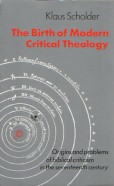|
|
Classic Reprints and Out-of-Print |
|
Reprint Spotlight: The Life of Jesus Jesus'
Proclamation of
- Select new &
used Contact Information:
More detailed information may be found in the Order Information section. |
Origins and Problems of Biblical Criticism in the Seventeenth Century
by Klaus Scholder
 |
List Price: Paper - 184 pp Summary How that happened is the story told in this book. The key element in Christian claims to truth was, of course, the Bible, and Professor Scholder begins by showing how a challenge to that claim was already being mounted in the previous century by the Socinians, with their discussion of the relationship between reason, scripture and dogma. Then came controversies over specific issues, which are illustrated in detail. The findings of Copernicus and Galileo questioned the credibility of the biblical view of the place of the earth within the universe on the basis of astronomy; in the wake of the voyages of discovery, other equally important if lesser known figures questioned the biblical view of history on the basis of new geographical evidence which had come to light. Now there seemed to be not one truth, but two: the truths of the Bible and the truth ascertained by modern investigations - and there were still the challenges of Descartes and Spinoza to come. The consequences of the seventeenth-century intellectual revolution are still with us, and there is no better guide to an understanding than this most-gifted historian of our age. |
Contact Information (See also Order Information to place orders)
E-Mail: siglerpr@sunlink.net
Sigler Press
9 Sycamore Drive
Mifflintown, PA 17059
USA
Phone/Fax: (570)389-8223
Maintained by Jason T. Lamoreaux
jtdlam@earthlink.net
|
|
